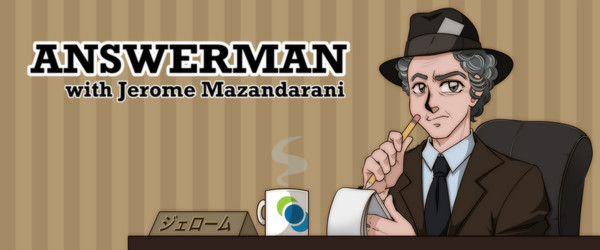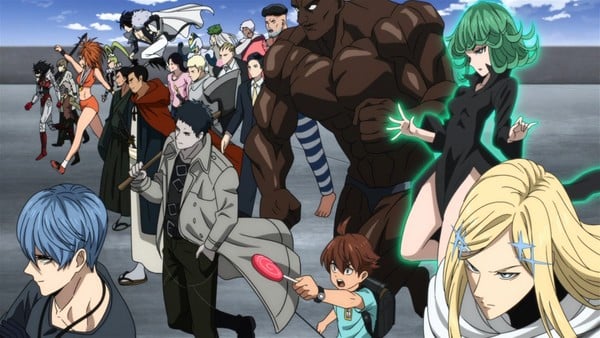Answerman
The Woes That Befall One Punch Man Season 3
by Jerome Mazandarani,

Keen Foxxx asks:
"I'd love to hear your thoughts on One Punch Man season 3. What's actually going on with the production? How can such a popular franchise face so many issues? Don't the people in charge realize the mess this creates and the potential financial and morale damage to staff for a series this beloved? I also heard the director recently deleted their Twitter account due to backlash. What's the story there?"
One Punch Man Season 1 premiered in October 2015, and it quickly became a global phenomenon. Today, it has a 100% Tomatometer and 95% Popcornmeter scores, and is ranked the 4th most popular anime of all time on My Anime List. It is one of the most well-regarded anime of all time.
The production delay and apparent lowering of “animation quality” on season two (spring 2019) resulted in a more muted response from critics and the fandom, but that was nothing compared to the massive drop-off in praise for Season 3, which currently sits at 5% Popcornmeter score on RottenTomatoes, six episodes in to this latest cour. What the heck went wrong?
Bandai Namco Filmworks is the senior committee member for the anime franchise, managing the global rights and planning alongside the manga copyright manager, Shueisha. Viz Media secured the master license for season one and has continued to manage the international master license (excluding Asia) for all seasons. Manga Entertainment distributed the UK home video rights to season one during my tenure. We sold bucketloads. It remains one of my favorite seinen anime of the past decade.

I believe that part of the series' genius lies in placing the American Superman myth within the context of everyday Japanese salaryman anxiety. Saitama, a bored superhero who defeats every opponent with one punch, worries about making rent and missing supermarket bargains. The fantastical battles ground themselves in mundane economic reality. I often use One Punch Man as an excellent example of the Japanese lens turned on an international genre trope, and as a reason why part of anime's success lies in its narrative perspective and tone of voice, which are impossible to replicate outside the culture.
Of course, anime is a visual medium as much as a writer's medium. Studio Madhouse and director Shingo Natsume captured lightning in a bottle with Season One, approaching ONE's webcomic and Yūsuke Murata's manga with genuine passion. The 12-episode strategy served multiple purposes: risk management, quality control, and optimal pacing. This allowed Madhouse to maintain superior visual standards without the constraints of continuous production.
The above is the decisive critical factor in One Punch Man's first season's success. Natsume's personal reputation and industry connections secured elite freelance animators. The highly concentrated quality of Season One was inextricably linked to his network. His reputation attracted animation stars. When Natsume moved to other projects like Boogiepop and Others, that specific talent pool largely went with him.
Season Two aired April-July 2019. The fandom was surprised to learn production had moved to J.C. Staff under director Chikara Sakurai. Scheduling issues drove this decision because Natsume was already committed elsewhere, and the production committee refused to wait. To be fair to them, how long were they expected to hold fire? Three and a half years had already passed. Should they have waited another five or six years?
Because Season One's animation structure was director-centric and dependent on that specific talent pool, Natsume's absence meant the core creative engine couldn't be reassembled. The unique visual standard collapsed when the leading talent was no longer available. The staggering fall from grace of One Punch Man is ultimately a sign of the times, and to be honest with you, a lot of the blame lies with us, the global anime fandom.
Too much anime is being made, and I am sorry to admit this, but anime's overall quality and consistency have suffered as a result. Are you aware that anime production has doubled in the past ten years? That's thanks to streaming. As Crunchyroll reminds us, "There is a fan for every show." True, but just because one guy in Pittsburgh really likes Tokyo Wet Nurse Revenge Isekai Idol Stage Act Season Three doesn't mean anyone else does. Too much anime is being produced, and there's not enough talent to spread around, as is evident with One Punch Man Season two and now Season three.
If One Punch Man Season 2 is the tragic victim of wider industrial malaise, it's difficult to apply the same sympathy to Season 3. The revolving door turned again with relatively unknown director Shinpei Nagai replacing Sakurai. Nagai's previous directing credits include Sacrificial Princess and the King of Beasts, and I Can't Understand What My Husband Is Saying. Many of the second season's staff remained unchanged, including series writer Tomohiro Suzuki, character designer Chikashi Kubota, and composer Makoto Miyazaki.
Unfortunately, J.C. Staff is up the creek without a paddle when it comes to negative fan reactions, and it really disappoints me. When I see anime fans attacking directors, crew, or studios, it usually betrays the fandom's lack of understanding of how their favorite media is produced. I write a lot about my concerns regarding the unsustainable business practices of the anime-industrial-complex. While I place most industry woes at the feet of chain-smoking salaryman executives chasing dollars at animators' expense, I don't write enough about the absolutely toxic environment some anime viewers have created for directors, designers, and storyboardists.
Most of these anonymous opinion-makers know very little about animation and anime production. They're experts at comparing animated scenes to manga panels, but that's not creative criticism. It's obsessive nitpicking that belies a fundamental misunderstanding of how the two media differ.
None of these bedroom "experts" writes passionately about original anime filmmaking, because that would display their utter lack of knowledge. Anime is a medium. It's not a genre, and it's not simply animating still manga panels. Animation is capturing movement and emotion in hand-drawn moving images. It's escape and immersion in fabricated worlds created by pencil, pen, paper, and ink. It's magic, singular and distinct from manga.
To attack an anime director for a supposed lack of experience in a tragically mishandled franchise betrays an utter lack of understanding of the art form they purportedly love, and it really needs to stop. These “passionate” fans are making life unbearable for anime directors, and, as this cautionary tale shows, the director is the lifeblood of any good anime production.
The disappointment many feel about seasons two and three can't be laid at any one individual's feet. Nobody in a production committee deliberately invests in a new anime project expecting it to fail. Anime is the uneasy bedfellow of art and commerce. Waiting five to six years between seasons to secure the same director and A-team would've been commercially risky. The committee may have risked losing adaptation rights from Shueisha. With hindsight, they set the bar so high in season one that whatever they did would likely have met with disappointment.
So here we are. Halfway through season three, the lowest-ranked anime of Fall 2025 according to MyAnimeList, with a series director who permanently deleted his X account due to harassment from supposed "fans." To be honest, we should all delete our X accounts. It's a terrible virtual space for preserving mental health. One of the hardest things about reporting anime news is using that cesspit for discovery. "But, Jerome-san! Japanese X is different!" Is it? I recently reported a case of slander involving a Japanese fan and the mangaka they targeted for abuse on that very platform.
One Punch Man is a classic example of what happens when good anime goes bad. It shows the limitations of what animation directors and production staff can achieve creatively when adapting incredibly detailed, challenging manga. It highlights the limitations of the production committee's business model, a system designed to mitigate risk while maximizing IP reach across publishing, distribution, marketing, and merchandising. One Punch Man shows some committees' weakness in managing the creative inputs necessary to generate hits in today's oversaturated market that is serviced by an over-capacity animation production industry.
I wouldn't sweat it too much about One Punch Man—the anime's travails. I am confident there will be a reboot at some point. We live in the age of perpetual remakes, recycling, and upcycling. There is no reason why Shueisha can't consider a “The One Piece” return to the source material. Why not create a brand-new series adaptation that potentially involves some of the original creative dream team and incorporates new production techniques and technology, such as hybrid anime, to create a visually spectacular and consistent retelling of the legend of One Punch Man? After all! There have been sixteen different iterations of Jerry Siegel and Joe Shuster's “Superman” since that comic was first published in 1938. That's the thing about legends. They live on.
Do YOU have a question for the Answerman?
We'd love to answer your questions and especially encourage questions inspired by recent news and headlines.
However, READ THIS FIRST:
● CHECK THE ARCHIVES. Over the years, we've answered THOUSANDS of questions and might have already answered yours!
● We cannot tell you if or when a show will get another season, nor can we help you get in touch with any producers, artists, creators, actors, or licensors.
● Only submit your question once.
● We take questions by email only. (Tweeted questions get ignored!)
● Please keep your questions within a paragraph length.
●The email address is [email protected].
Thank you!
discuss this in the forum (5 posts) |